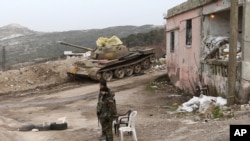Humanitarian access to northwestern Syria could be cut off unless Russia halts its aerial bombardment of routes supplying hundreds of thousands of people with food and water, aid workers warned ahead of an international donor conference on Thursday.
The alarm was sounded by an international aid agency, exclusively to the Thomson Reuters Foundation, as a Syrian government offensive, backed by heavy Russian air strikes, threatened to cut rebel supply lines from Turkey into the northern city of Aleppo earlier this week.
As the fighting raged, efforts were being made by the United Nations in Geneva to get the warring sides to negotiate an end to the conflict that has killed 250,000 people, driven a wave of refugees and empowered Islamic State militants.
But with opposition and government representatives refusing to meet each other, aid agencies said it was vital the issue of humanitarian access and Russia's airstrikes be discussed by government and aid officials at the London funding conference.
European governments and EU institutions in Brussels are seeking to respond to a call by Britain, Germany and Norway, which are hosting the gathering, along with the United Nations and Kuwait, to double humanitarian aid to the region.
U.N. agencies are appealing for a total of $7.73 billion to cope with Syria's needs this year, with a further $1.2 billion required by regional governments for their own plans to deal with the impact of Syria's conflict.
Civilians in the governorate of Aleppo and in the neighboring province, Idlib, holding out in what is left of their homes, schools, shops and bakeries, rely on humanitarian aid brought in through two designated crossing points from Turkey.
Idlib has been controlled by opposition forces since 2015, while Aleppo is split between government and rebel-controlled areas.
The aid agency said the two crossing points, Bab al-Hawa and Bab al-Salam, were controlled by opposition forces on the Syrian side of the border.
In an internal report, the aid agency said the Russian air force was still targeting the rebel groups behind frontlines in what might be part of a Syrian government strategy aimed at wresting control of the crossing points from the opposition.
"This would constitute a significant victory for the Syrian government as it would essentially cut opposition-held territory off from Turkey," the aid agency said in the report seen by the Thomson Reuters Foundation.
The charity, which has been working in Syria since the war began five years ago, also said the current level of aerial bombardment was making the route too dangerous for humanitarian convoys and complicating life for civilians.
Children stay home from school
Russia began airstrikes in September, tilting the war in President Bashar al-Assad's favor, after major setbacks earlier in 2015 brought rebel groups close to the coastal heartland of his Alawite sect.
"Parents are keeping children home from school because the schools are targets. Multiple markets have been hit pushing up the price of goods," said a spokeswoman for the aid agency on condition she and her organization were not identified.
The Russian Defense Ministry did not respond immediately to request for comment, but it has repeatedly said its air force targets a range of militants in Syria, not just Islamic State, although it insists it focuses on IS.
Russia's air force carried out 468 sorties in Syria last week, hitting more than 1,300 "terrorist" targets, Russian news agencies quoted Russia's Defense Ministry as saying on Monday.
The Defense Ministry also delivered more than 200 tons of humanitarian aid to the besieged Syrian town of Deir al-Zor in January, agencies quoted it as saying.
Nearly three million people received food aid brought across the border from Turkey in December 2015, the United Nations Office of the Coordinator for Humanitarian Affairs (OCHA) said.
The U.N. World Food Program said the airstrikes had delayed the movement of its convoys across the border from Turkey, while some NGOs said their staff were reluctant to make the journey because of the insecurity.
"The targeting of trucks is endangering the cross-border missions and increasing the difficulties reaching people in need in northern Syria," said Fadi Hakim, coordinator of a network of Syrian non-governmental organizations (NGOs) operating across the Turkey-Syria border.
Some NGOs have already closed their offices near border areas as they feel it is too dangerous for their staff, he said.





